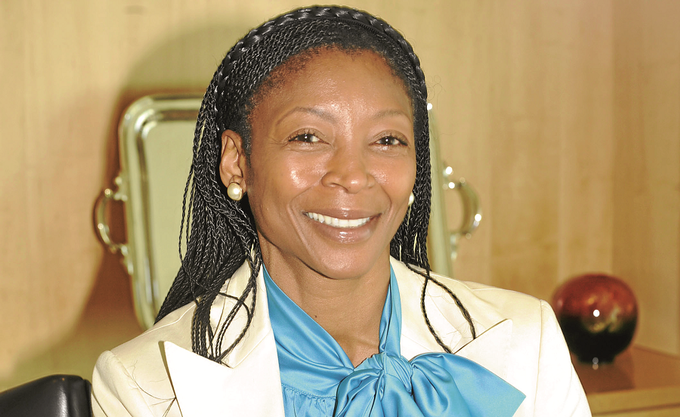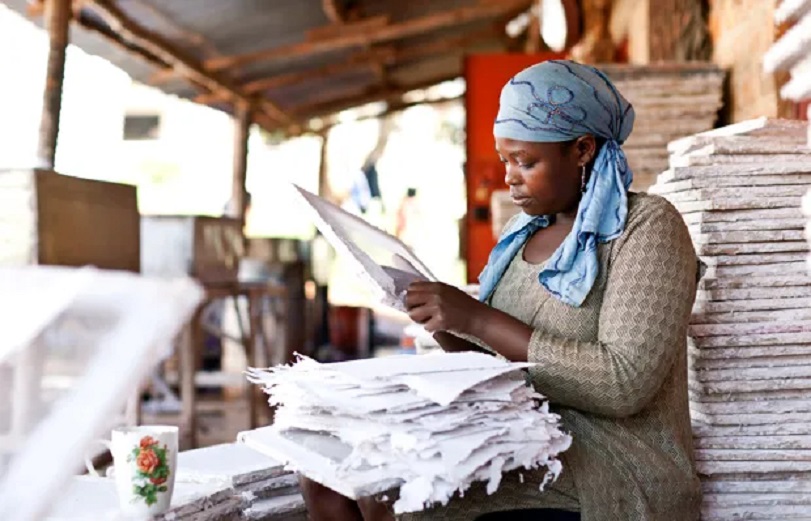Economy
African Exchanges Should Focus on Smaller Businesses


By Nonkululeko Nyembezi-Heita
The African growth story is no longer a fairy tale. Over the past decade multinational companies, private equity funds and infrastructure development programmes have channelled capital to the continent as they began to realise the true potential it holds, but like most emerging market regions, Africa is no longer the ‘flavour of the month’.
Yet those of us who run Africa’s Capital Markets have to admit that only a small portion of global investment flows to this region come through our platforms. Although there are 29 stock exchanges located across 27 African countries, many still do not offer enough liquidity to attract meaningful levels of investment.
This is a difficult obstacle to overcome, as a lack of liquidity can only be addressed through higher levels of investment on our exchanges.
Many of our exchanges also still need to realise the importance of providing accurate and timely market information. This lack of information makes investors much more hesitant about investing on the continent and perpetuates the view that Africa is still the dark continent.
More liquidity, better access to information and enabling regulation will generate more interest from foreign market participants because as a continent we are competing with other emerging and frontier markets for both local and international investment flows.
The role of African stock exchanges is far greater than providing foreign investors with a potential entry point to the continent. Our markets provide platforms for companies to raise capital to fund their growth and expansion and can therefore play a vital role in fostering and sustaining economic growth.
However, for Capital Markets to truly make a meaningful difference to economic growth and development we must be truly inclusive in our approach. Our markets cannot be accessible to only large companies.
While big companies make important contributions to an economy, they do not represent it in its entirety. Share price trends of these Groups often do not truly reflect the economic reality that most Africans experience and in which they are trying to build their businesses.
The JSE’s answer to this challenge has been to move down the continuum of funding to also provide capital-raising platforms for small and medium-sized businesses which form the true engine driving many developing economies.
In 2003, the JSE created the AltX platform to enable companies to grow within the framework of a highly reputable market place, while also providing investors with exposure to these businesses in a regulated environment.
At present, there are 61 companies listed on the AltX, with a total market capitalisation of R39.19 billion as at 21 November 2016. Since the inception of the AltX 13 years ago, more than 29 companies have migrated to the JSE’s Main Board, demonstrating that the AltX is a catalyst for growth.
We are also working on a project to assist even smaller companies than those on our AltX board to raise capital. This will provide these companies with the opportunity to expand their roles in the real economy.
The development of platforms for small to medium-sized businesses to list across African capital markets will also allow private equity investors to consider listing as an effective way to realising the return on their investments.
This means that the development of stock exchanges will not only encourage further investment through the exchanges themselves, but also in the broader real economy. The listing process can also contribute to a company’s development through encouraging greater transparency and stronger corporate governance.
How to bring stock exchanges and smaller businesses together will be one of the key topics discussed this month at the Annual African Securities Exchanges Association (ASEA) Conference and General Meeting.
The theme of this year’s conference, taking place in Kigali Rwanda, is The Road to 2030: Making the African Capital Markets Relevant to the real economy. This key annual event in Africa’s Capital Markets sector enables markets to discuss how African securities exchanges can become more effective so that they can play a bigger role in mobilising capital for African businesses to drive our economies onto the global economic stage.
We cannot deny that Africa is currently experiencing uneven levels of economic growth, but there are some markets that are showing consistently good growth which we need to take advantage of. The world is facing challenges on multiple fronts as the U.S. Federal Reserve continues its monetary tightening, Europe is struggling to manage migrant and debt crisis, China’s financial stability is in doubt – all weighing on emerging economies.
Most of these influences fall outside our control. But what is left within Africa’s control is the ability to create an environment in which small and medium-sized businesses can thrive. The shift in focus from large corporates to smaller enterprises is but a natural progression in the evolution of capital markets as these are the businesses which are creating jobs, fostering innovation and pushing the African economy forward despite stronger headwinds like lower global growth and depressed commodity prices.
Nonkululeko Nyembezi-Heita is the Chairman, Johannesburg Stock Exchange (JSE)
Economy
Flour Mills Supports 2026 Paris International Agricultural Show

By Modupe Gbadeyanka
For the second time, Flour Mills of Nigeria Plc is sponsoring the Paris International Agricultural Show (PIAS) as part of its strategies to fortify its ties with France.
The 2026 PIAS kicked off on February 21 and will end on March 1, with about 607,503 visitors, nearly 4,000 animals, and over 1,000 exhibitors in attendance last year, and this year’s programme has already shown signs of being bigger and better.
The theme for this year’s event is Generations Solution. It is to foster knowledge transfer from younger generations and structure processes through which knowledge can be harnessed to drive technological advancement within the global agricultural sector.
In his address on the inaugural day of the Nigerian Pavilion on February 23, the Managing Director for FMN Agro and Director of Strategic Engagement/Stakeholder Relations, Mr Sadiq Usman, said, “At FMN, our mission is Feeding and Enriching Lives Every Day.
“This is a mandate we have fulfilled through decades of economic shifts, rooted in a culture of deep resilience and constant innovation. We support this pavilion because FMN recognises that the next frontier of global Agribusiness lies in high-level technical exchange.
“We thank the France-Nigeria Business Council (FNBC), the organisers of the PIAS, and our fellow members of the Nigerian Pavilion – Dangote, BUA, Zenith, Access, and our partners at Creativo El Matador and Soilless Farm Lab— we are exceedingly pleased to work to showcase the true face of Nigerian commerce.”
Speaking on the invaluable nature of the relationship between Nigeria and France, and the FMN’s commitment to process and product innovation, Mr John G. Coumantaros, stated, “The France – Nigeria relationship is a valuable partnership built on a shared value agenda that fosters remarkable Intercontinental trade growth.
“Also, as an organisation with over six decades of transformational footprint in Nigeria and progressively across the African Continent, FMN has been unwaveringly committed to product and process innovation.
“Therefore, our continuous partnership with France for the success of the Paris International Agricultural Show further buttresses the thriving relationship between both countries.”
PIAS is one of the most widely attended agricultural shows, with thousands of people from across the world in attendance.
Economy
NEITI Backs Tinubu’s Executive Order 9 on Oil Revenue Remittances

By Adedapo Adesanya
Despite reservations from some quarters, the Nigeria Extractive Industries Transparency Initiative (NEITI) has praised President Bola Tinubu’s Executive Order 9, which mandates direct remittances of all government revenues from tax oil, profit oil, profit gas, and royalty oil under Production Sharing Contracts, profit sharing, and risk service contracts straight to the Federation Account.
Issued on February 13, 2026, the order aims to safeguard oil and gas revenues, curb wasteful spending, and eliminate leakages by requiring operators to pay all entitlements directly into the federation account.
NEITI executive secretary, Musa Sarkin Adar, called it “a bold step in ongoing fiscal reforms to improve financial transparency, strengthen accountability, and mobilise resources for citizens’ development,” noting that the directive aligns with Section 162 of Nigeria’s Constitution.
He noted that for 20 years, NEITI has pushed for all government revenues to flow into the Federation Account transparently, calling the move a win.
For instance, in its 2017 report titled Unremitted Funds, Economic Recovery and Oil Sector Reform, NEITI revealed that over $20 billion in due remittances had not reached the government, fueling fiscal woes and prompting high-level reforms.
Mr Adar described the order as a key milestone in Nigeria’s EITI implementation and urged amendments to align it with these reforms.
He affirmed NEITI’s role in the Petroleum Industry Act (PIA) and pledged close collaboration with stakeholders, anti-corruption bodies, and partners to sustain transparent management of Nigeria’s mineral resources.
Meanwhile, others like the Petroleum and Natural Gas Senior Staff Association of Nigeria (PENGASSAN) have kicked against the order, saying it poses a serious threat to the stability of the oil and gas industry, calling it a “direct attack” on the PIA.
Speaking at the union’s National Executive Council (NEC) meeting in Abuja on Tuesday, PENGASSAN President, Mr Festus Osifo, said provisions of the order, particularly the directive to remit 30 per cent of profit oil from Production Sharing Contracts (PSCs) directly to the Federation Account, could destabilise operations at the Nigerian National Petroleum Company (NNPC) Limited.
Mr Osifo firmly dispelled rumours of imminent protests by the union, despite widespread claims that the controversial executive order threatens the livelihoods of 10,000 senior staff workers at NNPC.
He noted, however, that the union had begun engagements with government officials, including the Presidential Implementation Committee, and expressed optimism that common ground would be reached.
Mr Osifo, who also serves as President of the Trade Union Congress (TUC), expressed concerns that diverting the 30 per cent profit oil allocation to the Federation Account Allocation Committee (FAAC), without clearly defining how the statutory management fee would be refunded to NNPC, could affect the salaries of hundreds of PENGASSAN members.
Economy
Dangote Cement Deepens Dominance, Export Activities With $1bn Sinoma Deal

By Aduragbemi Omiyale
To strengthen its domestic market dominance, drive its export activities, optimise existing operational assets and enhance production efficiency and capacity expansion, Dangote Cement Plc has sealed $1 billion strategic agreements with Sinoma International Engineering for cement projects across Africa.
The president of Dangote Industries Limited, the parent firm of Dangote Cement, Mr Aliko Dangote, disclosed that the deal reinforces the company’s long-term growth strategy and aligns with the broader aspirations of the Dangote Group’s Vision 2030.
According to him, Sinoma will construct 12 new projects and expand others for the cement organisation across Africa, helping to achieve 80 million tonnes per annum (MTPA) production capacity by 2030, while supporting the group’s overarching target of generating $100 billion in revenue within the same period.
Under the Strategic Framework Agreement, Sinoma will collaborate with Dangote Cement on the delivery of new plants, brownfield expansions, and modernisation initiatives aimed at strengthening operational performance across key markets.
The new projects include a new integrated line in Northern Nigeria with a satellite grinding unit, a new line in Ethiopia and other projects in Zambia/Zimbabwe, Tanzania, Sierra Leone and Cameroon. In Nigeria, Sinoma will also handle different projects in Itori, Apapa, Lekki, Port Harcourt and Onne.
The projects signal Dangote Cement’s sustained commitment to consolidating its leadership position within the African cement industry, while enhancing its competitiveness on the global stage.
Chairman of the Dangote Cement board, Mr Emmanuel Ikazoboh, during the agreement signing event in Lagos, explained that the new projects would enable the company to play a critical role in actualising Dangote Group’s Vision 2030.
The new projects, when completed, will increase Dangote Cement’s capacity and dominant position in Africa’s cement industry.
On his part, the Managing Director of Dangote Cement, Mr Arvind Pathak, said the agreement reflects the company’s determination to grow its investments across African markets to close supply gaps and support the continent’s infrastructural ambitions.
According to him, Dangote Cement is committed to making Africa fully self‑sufficient in cement production, creating more value and linkages, leading to increased economic activities and a reduction in unemployment.
-

 Feature/OPED6 years ago
Feature/OPED6 years agoDavos was Different this year
-
Travel/Tourism10 years ago
Lagos Seals Western Lodge Hotel In Ikorodu
-

 Showbiz3 years ago
Showbiz3 years agoEstranged Lover Releases Videos of Empress Njamah Bathing
-

 Banking8 years ago
Banking8 years agoSort Codes of GTBank Branches in Nigeria
-

 Economy3 years ago
Economy3 years agoSubsidy Removal: CNG at N130 Per Litre Cheaper Than Petrol—IPMAN
-

 Banking3 years ago
Banking3 years agoSort Codes of UBA Branches in Nigeria
-

 Banking3 years ago
Banking3 years agoFirst Bank Announces Planned Downtime
-

 Sports3 years ago
Sports3 years agoHighest Paid Nigerian Footballer – How Much Do Nigerian Footballers Earn






















